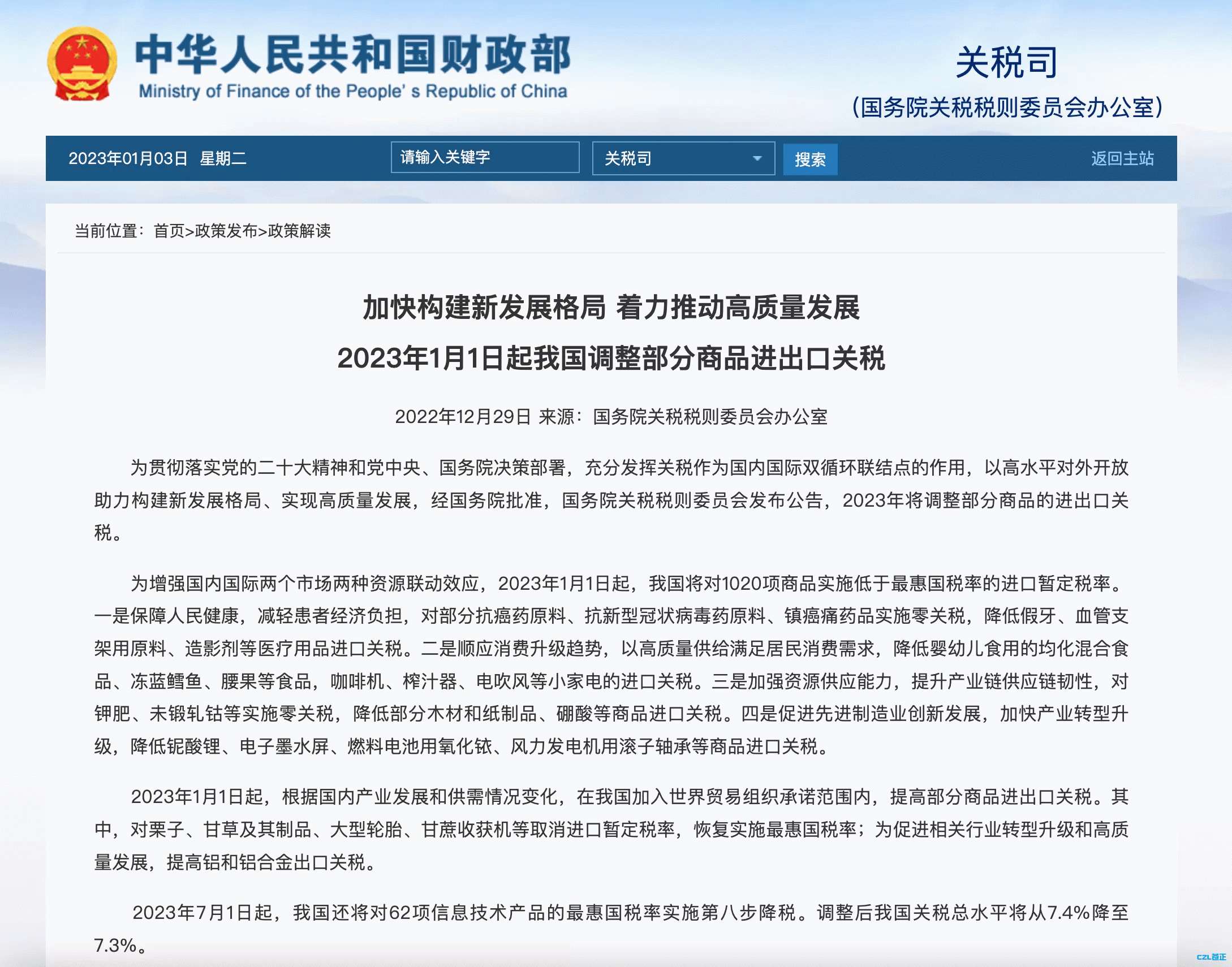This includes zero tariffs on some raw materials for anti-cancer drugs, raw materials for anti-new coronavirus drugs, and cancer analgesics; lower import tariffs on medical supplies such as dentures, raw materials for vascular stents, contrast agents, etc.; homogenized mixed foods for infants and young children, frozen blue cod, cashews, etc.; small household appliances such as coffee machines, juicers, and hair dryers; lower import tariffs on some wood and paper products, boric acid, etc.; lower import tariffs on lithium niobate, electronic ink screens, iridium oxide for fuel cells, roller bearings for wind turbines, etc.
Recently, the Office of the Tariff Commission of the State Council issued an announcement. In order to implement the spirit of the 20th National Congress of the Communist Party of China and the decisions and deployments of the Party Central Committee and the State Council, give full play to the role of tariffs as a connecting point between domestic and international dual circulations, and use high-level opening up to help build a new development pattern and achieve high-quality development, with the approval of the State Council, the import and export tariffs of some commodities will be adjusted in 2023.
According to the announcement, in order to enhance the linkage effect of the domestic and international markets and the two resources, starting from January 1, 2023, my country will implement a temporary import tariff lower than the most-favored-nation rate on 1,020 commodities.
First, to protect people's health and reduce the economic burden on patients, zero tariffs will be implemented on some anti-cancer drug raw materials, anti-new coronavirus drug raw materials, and cancer analgesics, and import tariffs on medical supplies such as dentures, raw materials for vascular stents, and contrast agents will be reduced.
The second is to adapt to the trend of consumption upgrading, meet residents' consumption needs with high-quality supply, and reduce import tariffs on homogenized mixed foods for infants and young children, frozen blue cod, cashews and other foods, and small household appliances such as coffee machines, juicers, and hair dryers.
The third is to strengthen resource supply capabilities, enhance the resilience of the industrial chain and supply chain, implement zero tariffs on potash fertilizers, unwrought cobalt, etc., and reduce import tariffs on some commodities such as wood and paper products, boric acid, etc.
Fourth, promote the innovative development of advanced manufacturing, accelerate industrial transformation and upgrading, and reduce import tariffs on commodities such as lithium niobate, electronic ink screens, iridium oxide for fuel cells, and roller bearings for wind turbines.
Starting from January 1, 2023, according to the development of domestic industries and changes in supply and demand, within the scope of my country's commitment to join the World Trade Organization, import and export tariffs on some commodities will be increased. Among them, the temporary import tariff rate for chestnuts, licorice and its products, large tires, sugarcane harvesters, etc. will be cancelled, and the most-favored-nation tariff rate will be restored; in order to promote the transformation and upgrading of related industries and high-quality development, the export tariff on aluminum and aluminum alloys will be increased.
Starting from July 1, 2023, my country will also implement the eighth step of tariff reduction on the most-favored-nation tariff rates of 62 information technology products. After the adjustment, my country's overall tariff level will drop from 7.4% to 7.3%.
In order to expand the global network of high-standard free trade zones, continue to promote high-level opening up, and promote the construction of an open world economy, according to the free trade agreements and preferential trade arrangements signed between my country and relevant countries or regions, the agreed tariff rates will be implemented on some goods originating from 29 countries or regions under 19 agreements in 2023. Among them, according to the relevant provisions of the Regional Comprehensive Economic Partnership Agreement (RCEP) and the entry into force of the agreement for Indonesia, the RCEP agreed tariff rates will be implemented on some goods originating from Indonesia from January 2, 2023.
In 2023, we will continue to implement preferential tariffs for the least developed countries that have established diplomatic relations with China and completed the exchange of documents, to support and help the least developed countries accelerate their development.
In order to adapt to the needs of industrial development and scientific and technological progress, the domestic sub-items will be appropriately adjusted in 2023, and white tea, vegetable seeds, surgical robots, laser radar and other tariff items will be added. After the adjustment, the total number of tariff items will be 8,948.
The above-mentioned adjustment measures adhere to the people-centered approach, fully, accurately and comprehensively implement the new development concept, coordinate development and security, support the construction of a new development pattern, and focus on promoting high-quality development. They are conducive to enhancing the endogenous driving force and reliability of the domestic circulation, supporting the cross-cycle design and counter-cyclical adjustment of macroeconomic policies, and promoting the overall improvement of economic operation; they are conducive to strengthening resource supply guarantees, accelerating the upgrading and development of the industrial system, and meeting the people's yearning for a better life; they are conducive to promoting high-level opening up, forming new advantages in international cooperation and competition, and improving the quality and level of international circulation.
